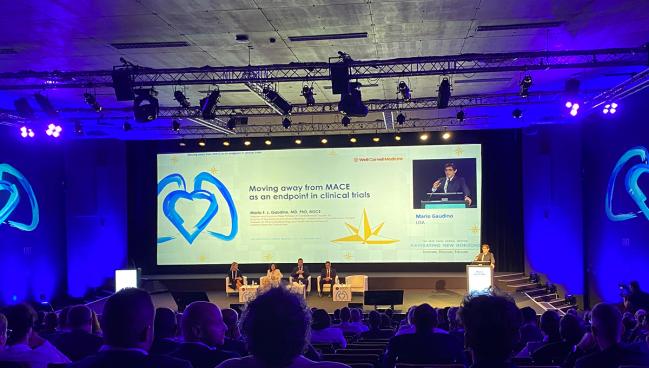MACE in CV Trials: Has the Outcome Outlived Its Role?
It’s time for an endpoint that includes quality of life and mortality, and weights events accordingly, says one surgeon.

LISBON, Portugal—The endpoint of major adverse cardiac events has outlived its usefulness in cardiovascular trials, and some say it’s time for it to be—mostly—retired.
That was the message from cardiac surgeon and trialist Mario Gaudino, MD, PhD (Weill Cornell Medicine, New York, NY), in a presentation Thursday at the European Association for Cardio-Thoracic Surgery annual meeting. The composite of MACE was developed as an endpoint for exploratory trials 30 years ago but became the gold standard for most contemporary cardiovascular trials, he explained.
Now it should be replaced with an endpoint that combines both hard and soft outcomes, encompassing such things as mortality and quality of life, and weights these events appropriately. MACE has long been appealing from an analytical perspective, because it made trial design and power calculations easy, Gaudino said.
“However, from a clinical perspective, MACE has very important limitations,” he noted. “One of the key limitations is that all the individual components of this composite outcome are weighted similarly, and this does not make a lot of clinical sense when you put together events with very different impacts on patient life, such as myocardial infarction and mortality.”
Additionally, a time-to-first-event analysis puts too much emphasis on early clinical events, he asserted. The heart of the problem, Gaudino stressed, is that “we have been designing clinical trials for trialists, not for patients.”
Whether cardiac surgeons are ready for such a change remains up for debate. Sigrid Sandner, MD (Medical University of Vienna, Austria), who co-chaired the session, told TCTMD that more education will be needed to convince the community that a non-MACE endpoint will be a good thing.
“We surgeons always want to win in trials,” she said. “We're used to winning on outcomes like myocardial infarction and repeat revascularization, and I think there may be some concerns in the community that if you have quality of life as an endpoint that these events that we're used to winning on may not be adequately captured and then reflected in quality of life.”
That said, Sandner added, “I think that focusing on patient-reported outcomes and quality of life is absolutely the right direction to go.”
Win Ratio the ‘Hot New Modality’
Gaudino made many points echoed in a paper he co-authored with Eugene Braunwald, MD (Brigham and Women’s Hospital, Boston, MA), and Gregg W. Stone, MD (Icahn School of Medicine at Mount Sinai, New York, NY), that was published in the European Heart Journal in July.
For the ongoing RECHARGE trial, which is comparing CABG and PCI in underrepresented minority patients, Gaudino and Stone have developed a new primary composite endpoint that combines time-averaged quality of life with mortality and is analyzed using the win ratio.
This endpoint “looks at the wellbeing of the patient globally, not only in the cardiovascular system,” Gaudino said. “And second, it evaluates every single clinical event based on the impact that those events have on the patient's well-being.”
An endpoint like this might not be appropriate for all cardiovascular trials, he explained. For a study comparing two stents, “the conventional approach is fine,” especially given that measuring quality of life requires more time and trained personnel. “But when you are testing interventions that are very different, such as PCI and CABG or TAVR and SAVR, [and] those interventions do not only affect cardiovascular outcomes but more general quality of life, this approach should be used,” said Gaudino.
We have been designing clinical trials for trialists, not for patients. Mario Gaudino
Michael Borger, MD, PhD (Heart Center of Leipzig, Germany), who served as a panelist during the session, questioned whether this new endpoint would be welcomed by surgeons.
The win ratio, he said, is “the hot new modality that's being used for a lot of the big, randomized trials now. In cardiac surgery, we have very little experience with it. And now we're mixing in also a new outcome that we also don't have experience with. I'm not saying I disagree with you. . . . My concern is that you're introducing a statistical method that most people won't be able to get their heads around.”
The win ratio is “not easily displayable, [so it’s] not easy to convey exactly what the take-home message is,” Borger told TCTMD. “And when human beings don't understand something, they naturally start to look for other explanations or conspiracy theories or other explanations, which I think we have to be wary of.”
Gaudino disagrees that the endpoint is hard for people to wrap their heads around, but acknowledged the win ratio has been both welcomed and rebuffed in cardiovascular research. The “beauty” of the win ratio over any other hierarchical outcome is that it weights disparate outcomes that make up a composite endpoint. “Mortality is more important than quality of life,” he said. “If you don’t use a win ratio approach in a trial, then the trial will be dominated by quality of life, and you may miss an important difference in mortality and that’s exactly what you don’t want.
“People know how to read, and they understand the hazard ratio and if the statistic behind the hazard ratio is slightly different, nothing will change,” Gaudino continued.
Borger said he is “very interested to see how this works out” in the RECHARGE trial and “how it is accepted within the community.” He acknowledged some weaknesses of MACE as an endpoint, namely that the different components are not equal and can vary by trial, but pointed out that it is not affected by the placebo effect.
To TCTMD, Gaudino said he remains hopeful. “Every time you introduce something new, some people love it and some people are defensive,” he said. “In general, the cardiac surgery community is very innovative and cutting-edge, so I think once you show the rationale for what you are doing, I'm optimistic.”
Yael L. Maxwell is Senior Medical Journalist for TCTMD and Section Editor of TCTMD's Fellows Forum. She served as the inaugural…
Read Full BioSources
Gaudino M. Moving away from MACE as an endpoint in clinical trials. Presented at: EACTS 2024. October 10, 2024. Lisbon, Portugal.
Disclosures
- Gaudino reports serving as the PI for the RECHARGE trial.





Comments